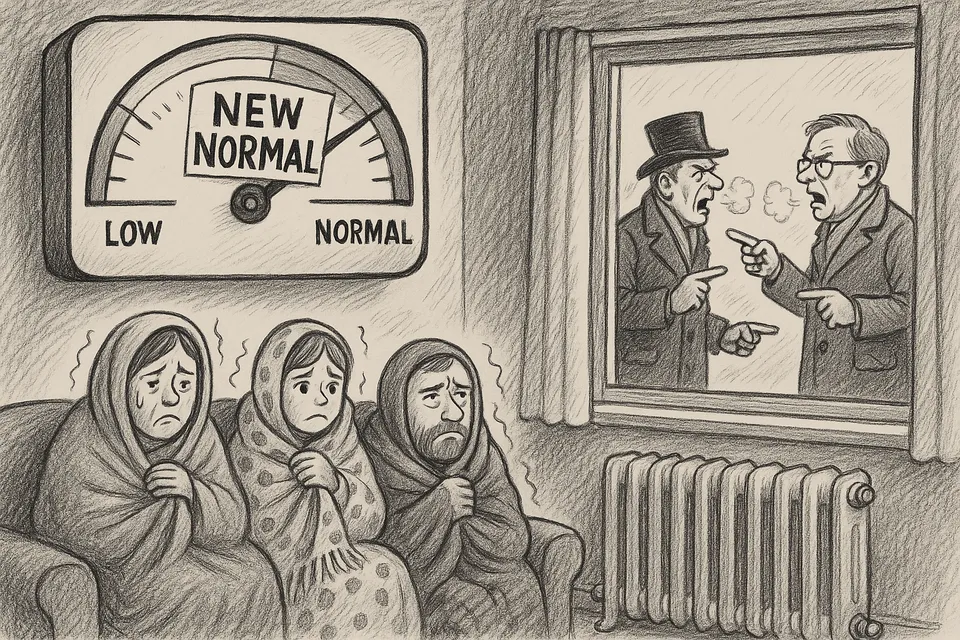Energy Bills Rise Again While Politicians Play Blame Games

The New Normal for British Households
British households will pay £1,755 for energy from October - another increase sold as modest while families sink deeper into debt. The 2% rise announced by Ofgem marks the institutionalization of what was once called a "crisis" but is now simply the new normal for a country that cannot deliver basic affordable energy to its citizens.
Commentary Based On
The Guardian
Typical annual energy bill to rise to £1,755 in Great Britain from October
The price cap will increase by £35 annually for typical dual-fuel households from October, affecting 9 million households on variable tariffs immediately. Electricity rates rise to 26.35p per kWh while standing charges - the fixed daily fees you pay regardless of usage - increase to 53.68p for electricity and 34.03p for gas.
Here’s what matters: energy bills remain £600 per year higher than before Ukraine’s invasion in 2022. That’s a permanent 52% increase that no political party is seriously attempting to reverse. Meanwhile, household energy debts have reached a record £4.15bn, accelerating even as politicians claim the “crisis” has stabilized.
The government’s warm home discount scheme expansion adds £15 to everyone’s bills to provide 2.7 million additional households with £150 reductions. Classic British policy-making: make everyone poorer to help some become slightly less poor, while energy companies continue posting healthy profits.
Critical Analysis
The Bipartisan Failure
Labour’s response perfectly encapsulates Britain’s political decay. They blame the Conservatives for “tying our country to the fossil fuel rollercoaster” while their own solution amounts to vague promises about “clean homegrown power” that will somehow “bring energy bills down for good” - at some unspecified future date.
Missing from their statement: any commitment to actually reduce bills now. Any explanation of how their policies differ meaningfully from Conservative ones. Any acknowledgment that Ofgem - the regulator supposedly protecting consumers - continues approving these increases under their watch.
The attack on Nigel Farage’s energy plans serves as convenient distraction theater. Whether you support renewable energy or fossil fuels becomes irrelevant when the regulatory system ensures bills rise regardless of energy source. The fundamental problem isn’t which type of energy we use, but a captured regulatory system that prioritizes industry profits over consumer affordability.
The Standing Charge Scandal
Buried in the technical details is perhaps the most revealing aspect: standing charges continue rising to fund “maintaining and upgrading Great Britain’s energy networks.” These are fixed daily charges you pay even if you use zero energy - a regressive tax hitting the poorest hardest.
The electricity standing charge alone will cost households £196 per year before they use a single unit of power. Add gas and you’re paying £320 annually just for the privilege of being connected. This represents a wealth transfer from consumers to energy companies disguised as “network maintenance.”
The Normalization of Decline
Cornwall Insight predicts a “slight” fall in January, depending on weather, geopolitics, and whether “new policy costs” are added. Translation: bills might drop marginally if we’re lucky, but will definitely rise if the government decides to fund more infrastructure through consumer bills rather than general taxation.
This is managed decline in action. What began as an acute crisis triggered by geopolitical events has morphed into a permanent reduction in living standards that politicians no longer even pretend they’ll reverse. The debate has shifted from “how do we return to affordable energy?” to “how much will bills increase this quarter?”
Pattern Recognition
This latest increase exemplifies three core failures of British governance:
Regulatory Capture: Ofgem consistently prioritizes industry stability over consumer protection, approving increases that push more households into debt while ensuring profitable returns for energy companies.
Political Theatre: Both major parties engage in performative disagreements while pursuing functionally identical policies that accept permanently higher bills as inevitable.
Institutional Amnesia: Nobody asks why Britain - once an energy exporter with North Sea resources - now cannot provide affordable energy to its own citizens. The systemic failures that created this situation remain unexamined and unaddressed.
Reality Check
The most telling statistic isn’t the 2% increase or even the £600 permanent premium since 2022. It’s the record £4.15bn in household energy debt. This represents millions of British families choosing between heating and eating, accumulating debts they cannot repay for a basic necessity previous generations took for granted.
Labour’s claim about protecting consumers rings hollow when their protection amounts to slightly expanding a discount scheme while accepting the fundamental premise that energy should cost 50% more than it did two years ago. Their promise to “bring energy bills down for good” through renewable investment is a promissory note with no date, no target, and no mechanism for accountability.
Meanwhile, standing charges rise, debt accumulates, and another winter approaches where millions will ration their heating. The energy companies will report healthy profits. Ofgem will approve the next increase. Politicians will blame each other. And British households will pay the price.
The Bigger Picture
This is what institutional decline looks like: not dramatic collapse but the steady normalization of degraded standards. Energy poverty, once considered a crisis requiring urgent intervention, has become an accepted feature of British life that politicians manage rather than solve.
The energy price cap - introduced to protect consumers - now functions as a mechanism for institutionalizing higher prices. The regulator meant to champion consumer interests instead ensures “network investment” through ever-rising standing charges. Political parties that once competed on reducing bills now argue only about who’s to blame for their increase.
Britain has transitioned from a country that could deliver affordable energy to its citizens to one where permanent energy poverty for millions is considered acceptable policy. The October price rise isn’t news - it’s simply another milestone in documenting this decline.
Commentary based on Typical annual energy bill to rise to £1,755 in Great Britain from October by Jillian Ambrose on The Guardian.